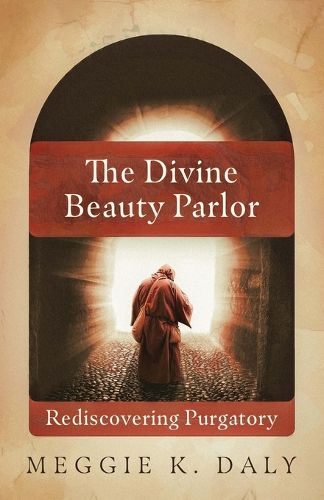Readings Newsletter
Become a Readings Member to make your shopping experience even easier.
Sign in or sign up for free!
You’re not far away from qualifying for FREE standard shipping within Australia
You’ve qualified for FREE standard shipping within Australia
The cart is loading…






This title is printed to order. This book may have been self-published. If so, we cannot guarantee the quality of the content. In the main most books will have gone through the editing process however some may not. We therefore suggest that you be aware of this before ordering this book. If in doubt check either the author or publisher’s details as we are unable to accept any returns unless they are faulty. Please contact us if you have any questions.
Catholic Media Association Book Awards 2024: Honorable Mention in the category Popular Presentation of the Catholic Faith.
The Divine Beauty Parlor: Rediscovering Purgatory is a captivating narrative that examines purgatory through the multifaceted approach of theology, philosophy, history, Christian anthropology, Catholic teaching, and Protestant objections. Extensively researched by Meggie K. Daly, the book is written from a Catholic perspective but with an ecumenical eye toward understanding the roots of Christian denominational differences regarding purgatory's existence.
Against the backdrop of a postmodern world, the book explores the concept of absolute truth through the prism of the "Three Pillars" that the Catholic Church uses to discern truth: Sacred Scripture, Sacred Tradition, and Magisterium. The book addresses the complexities of sin, guilt, and conscience and delves into the oft-misunderstood concept of temporal punishment for sin. Arguments for and against purgatory are framed within their respective theological views of justification, sanctification, and human psychology. Various theological models of purgatory are presented, emphasizing divine mercy, divine justice, or both with philosophical insight and historical perspective. The "work" of purgatory is speculated upon within the guardrails of Catholic doctrine.
The history of purgatory examines early Christian epitaphs and "literature," classical biblical exegesis, the writing of the early Greek and Latin Fathers, the impact of Scholasticism, and papal and council documents, including dogmatic declarations. The theology and historical roots of indulgences are unearthed, including their ties to early Christian penitential rites, the "Holy Wars" and Crusades, and their impact on the Protestant Reformation. Purgatory's depiction in medieval art, literature, and the legends and writings of saints are unveiled. Lastly, contemplation of traditional Catholic channels of grace and St. Therese of Lisieux's "Little Way" offers readers open pathways to potentially bypass purgatory.
Daly's penetrating approach and unique synthesis of information presume no previous knowledge other than the basics of the Christian faith and an inquisitive mind. The Divine Beauty Parlor is appropriate for anyone curious about Purgatory, those who desire a deeper understanding, and serious scholars alike.
$9.00 standard shipping within Australia
FREE standard shipping within Australia for orders over $100.00
Express & International shipping calculated at checkout
This title is printed to order. This book may have been self-published. If so, we cannot guarantee the quality of the content. In the main most books will have gone through the editing process however some may not. We therefore suggest that you be aware of this before ordering this book. If in doubt check either the author or publisher’s details as we are unable to accept any returns unless they are faulty. Please contact us if you have any questions.
Catholic Media Association Book Awards 2024: Honorable Mention in the category Popular Presentation of the Catholic Faith.
The Divine Beauty Parlor: Rediscovering Purgatory is a captivating narrative that examines purgatory through the multifaceted approach of theology, philosophy, history, Christian anthropology, Catholic teaching, and Protestant objections. Extensively researched by Meggie K. Daly, the book is written from a Catholic perspective but with an ecumenical eye toward understanding the roots of Christian denominational differences regarding purgatory's existence.
Against the backdrop of a postmodern world, the book explores the concept of absolute truth through the prism of the "Three Pillars" that the Catholic Church uses to discern truth: Sacred Scripture, Sacred Tradition, and Magisterium. The book addresses the complexities of sin, guilt, and conscience and delves into the oft-misunderstood concept of temporal punishment for sin. Arguments for and against purgatory are framed within their respective theological views of justification, sanctification, and human psychology. Various theological models of purgatory are presented, emphasizing divine mercy, divine justice, or both with philosophical insight and historical perspective. The "work" of purgatory is speculated upon within the guardrails of Catholic doctrine.
The history of purgatory examines early Christian epitaphs and "literature," classical biblical exegesis, the writing of the early Greek and Latin Fathers, the impact of Scholasticism, and papal and council documents, including dogmatic declarations. The theology and historical roots of indulgences are unearthed, including their ties to early Christian penitential rites, the "Holy Wars" and Crusades, and their impact on the Protestant Reformation. Purgatory's depiction in medieval art, literature, and the legends and writings of saints are unveiled. Lastly, contemplation of traditional Catholic channels of grace and St. Therese of Lisieux's "Little Way" offers readers open pathways to potentially bypass purgatory.
Daly's penetrating approach and unique synthesis of information presume no previous knowledge other than the basics of the Christian faith and an inquisitive mind. The Divine Beauty Parlor is appropriate for anyone curious about Purgatory, those who desire a deeper understanding, and serious scholars alike.